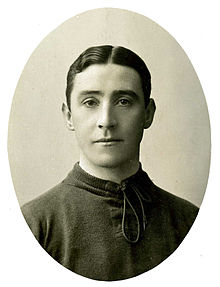 Jimmy Hogan in 1908 | |||||||||||||||||
| Personal information | |||||||||||||||||
|---|---|---|---|---|---|---|---|---|---|---|---|---|---|---|---|---|---|
| Full name | James Hogan | ||||||||||||||||
| Date of birth | 16 October 1882 | ||||||||||||||||
| Place of birth | Nelson, England | ||||||||||||||||
| Date of death | 30 January 1974 (aged 91) | ||||||||||||||||
| Place of death | Burnley, England | ||||||||||||||||
| Position(s) | Inside forward | ||||||||||||||||
| Senior career* | |||||||||||||||||
| Years | Team | Apps | (Gls) | ||||||||||||||
| 1902–1903 | Rochdale Town | ? | (?) | ||||||||||||||
| 1903–1905 | Burnley | 50 | (12) | ||||||||||||||
| 1905 | Nelson | ? | (?) | ||||||||||||||
| 1905–1908 | Fulham | 18 | (5) | ||||||||||||||
| 1908 | Swindon Town | 9 | (9) | ||||||||||||||
| 1908–1913 | Bolton Wanderers | 54 | (18) | ||||||||||||||
| Total | 131 | (44) | |||||||||||||||
| Managerial career | |||||||||||||||||
| 1910–1912 | FC Dordrecht | ||||||||||||||||
| 1910 | Netherlands | ||||||||||||||||
| 1911–1912 | Wiener Amateur-SV | ||||||||||||||||
| 1914–1921 | MTK Budapest | ||||||||||||||||
| 1918–1920 | Young Boys Bern | ||||||||||||||||
| 1924 | Switzerland | ||||||||||||||||
| 1925 | Lausanne Sports | ||||||||||||||||
| Dresdner SC | |||||||||||||||||
| 1925–1927 | MTK Budapest | ||||||||||||||||
| 1931–1932 | Austria Wien | ||||||||||||||||
| 1932–1933 | Racing Club de Paris | ||||||||||||||||
| 1933–1934 | Lausanne Sports | ||||||||||||||||
| 1934–1935 | Fulham | ||||||||||||||||
| 1936 | Austria | ||||||||||||||||
| 1936–1939 | Aston Villa | ||||||||||||||||
Medal record
| |||||||||||||||||
| *Club domestic league appearances and goals | |||||||||||||||||
James Hogan (16 October 1882 – 30 January 1974) was an English football player and coach.[1] He enjoyed some success as a footballer, reaching an FA Cup semi-final with Fulham in 1907–08, but his primary legacy is as a pioneer of the game and as an innovative coach across multiple European club and national sides. Named "the most influential coach there has ever been" by Jonathan Wilson,[1] Hogan is regarded by some as the architect of Total Football.[2][3]